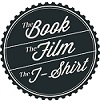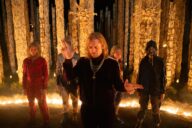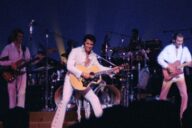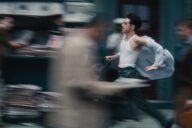The Gist:
Following her split from the Joker, Harley Quinn tries to figure out her place in the world. Meanwhile, the many people she’s wronged are trying to remove her from the world now that she’s no longer under the Joker’s protection. Before she knows it, her life depends on finding a very special diamond for crime lord Black Mask. What’s a girl to do?
The Review:
Birds of Prey is an important milestone for the DCEU in more ways than one. Aquaman and Shazam both did their part to move the shared universe away from its dark and edgy, executive meddling filled early days. Joker was an amazing film, but it was its own isolated project. Birds of Prey is DC’s chance to prove that they’ve learned two lessons. The first is that they understand the importance of building their own brand rather than just doing a darker and edgier imitation of Marvel. The second is that they understand what made Wonder Woman both genuinely feminist and successful. This second one is important as Marvel, for all its general success, failed to grasp this with Captain Marvel. So then; what does Birds of Prey bring to the table?
Something that becomes clear very early on is that this isn’t just a story about Harley Quinn; it’s a story being told by Harley Quinn. In Joker the choices by the director and the cinematography made it very clear that the events we were seeing were influenced by Arthur Fleck’s point of view. The more he embraced the identity of Joker; the brighter and sunnier Gotham became. A similar, but distinct idea is used in Birds of Prey. Since this is being told from Harley’s point of view, the narrative follows a very chaotic, often out of order, sequence. On more than a few occasions, we’ll be shown an event only to have Harley’s narration acknowledge that there’s the stuff that she’s accidentally skipped over. We’re then shown the preceding events before returning to where we were before. This approach could have backfired badly if not done very carefully. Fortunately, there’s a lot of talent behind this movie. We’re constantly being fed information by events so that when Harley introduces a character or plot point, it never feels like it comes out of nowhere. This is important as the other main characters (Renee Montoya, Black Canary, Cassandra Cain, and Huntress) aren’t all involved in the main plot right from the beginning. They only get their introductions by Harley when they get pulled into the main plot. The best example of how well this is done is Huntress’s introduction, which happens right before the climax of the movie. She’s only appeared briefly and sporadically up to this point, but when Harley’s narration gives her introduction, 95% of it is simply connecting the dots between information the viewer has already been given.
The plot itself is fairly straightforward; the core of it is neatly summed up above. Given the unique and chaotic method of telling the story, having a relatively straight forward plot is definitely a strength. This also allows the movie to be more of a character-based movie than plot-based.
Speaking of characters, the cast is well-chosen and plays deep, interesting and flawed characters. Margot Robbie was a standout in Suicide Squad, but here she gets to really stretch her legs and explore Harley’s character at the start of the post-Joker phase of her life (which, to be honest, is Harley Quinn at her most interesting). To absolutely no one’s surprise, Ewan McGregor is amazing as Black Mask, managing to really encapsulate the dangerous and unstable nature of Roman Sionis. He can either be hilarious or menacing depending on what the scene requires. These two are the standouts, but there’s no member of the main cast who doesn’t deliver a nuanced, well-done performance.
So, as DC’s second female-led superhero movie, what side of the Wonder Woman/Captain Marvel divide does it fall? To clarify, what made Wonder Woman such a good movie was that Diana’s character was allowed emotional vulnerability and to make mistakes. It makes her character far more engaging and underlines what makes her a hero when she gets back up and keeps fighting for what’s right anyway. Diana is shown as a badass by her actions; with the movie allowing the viewers to reach this conclusion themselves. By contrast, Carol Danvers isn’t allowed any real moments of emotional vulnerability or doubt. Even when she finds out that she’s been unwittingly helping the wrong side of genocide, she just shrugs her shoulders and starts fighting for the right side. Captain Marvel was full of clunky, telegraphed scenes that were the movie basically screaming down the camera ‘look how badass she is!’.
Fortunately, Birds of Prey proves that Wonder Woman wasn’t just a fluke for DC. Once again, we’re presented with lead characters with flaws and vulnerabilities who prove themselves as engaging, genuinely strong characters by their actions. At no point does it feel like the movie is trying to force down our throats that these characters are awesome. You come to this conclusion by yourself.
If I have to make a complaint, it’s that there are a few too many fight scenes in the movie. In the GCPD part of the movie alone, Harley gets into three separate, extended fight sequences. They’re all well put together and, taken in isolation are all entertaining. But, by the time we got to the final showdown, I wasn’t quite as engaged as I might have been if one or two had been cut.
The Verdict:
Slight padding with fight scenes aside, Birds of Prey is a hilarious, character-driven movie that is a masterpiece of fluid, dynamic storytelling.



















No Comments